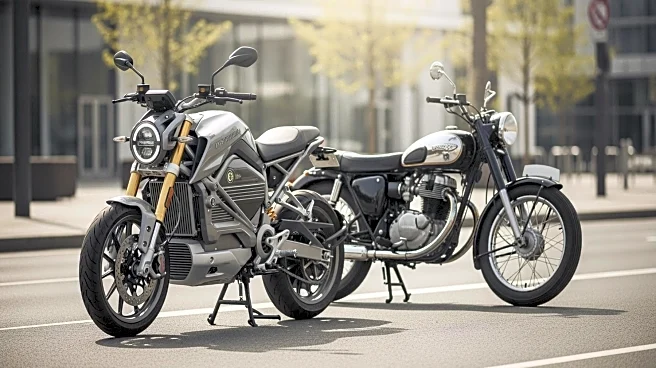What's Happening?
Vietnam is preparing to ban fossil-fuel motorcycles from its city centers starting in July 2026, as part of a national initiative to reduce emissions and air pollution. The government aims for a significant
portion of vehicles to run on electricity by 2030. This move is met with mixed reactions, as gas-powered bikes are currently more affordable and easier to maintain. However, electric bike sales are increasing, driven by startups like Dat Bike and VinFast, which are investing in infrastructure and offering incentives to encourage adoption. The transition is crucial for reducing air pollution, which is linked to thousands of deaths annually.
Why It's Important?
The shift to electric motorbikes in Vietnam is significant for several reasons. It represents a major step towards reducing air pollution and improving public health, as gas-powered vehicles contribute heavily to emissions. The transition could also boost local manufacturing and innovation, as Vietnam's motorbike market is one of the largest in Southeast Asia. This move may set a precedent for other developing countries looking to reduce their environmental impact. Additionally, the economic implications are substantial, with potential growth in the electric vehicle sector and increased investment opportunities.
What's Next?
Vietnam plans to implement subsidies and incentives to facilitate the transition to electric motorbikes. Ho Chi Minh City aims to replace 400,000 gasoline motorbikes with electric ones by 2028, starting with a ban on gas bikes for ride-hailing and delivery services in 2026. VinFast is set to launch battery-swapping stations nationwide, which could further support the shift. The government is also considering low-interest loans and tax breaks to encourage adoption. The success of these initiatives will depend on the affordability and performance of electric bikes compared to traditional models.
Beyond the Headlines
The transition to electric motorbikes in Vietnam could have broader implications for global environmental policy and urban planning. As countries observe Vietnam's approach, it may influence similar strategies in other regions. The focus on reducing emissions aligns with global efforts to combat climate change, and Vietnam's experience could provide valuable insights into the challenges and opportunities of transitioning to cleaner transportation.












